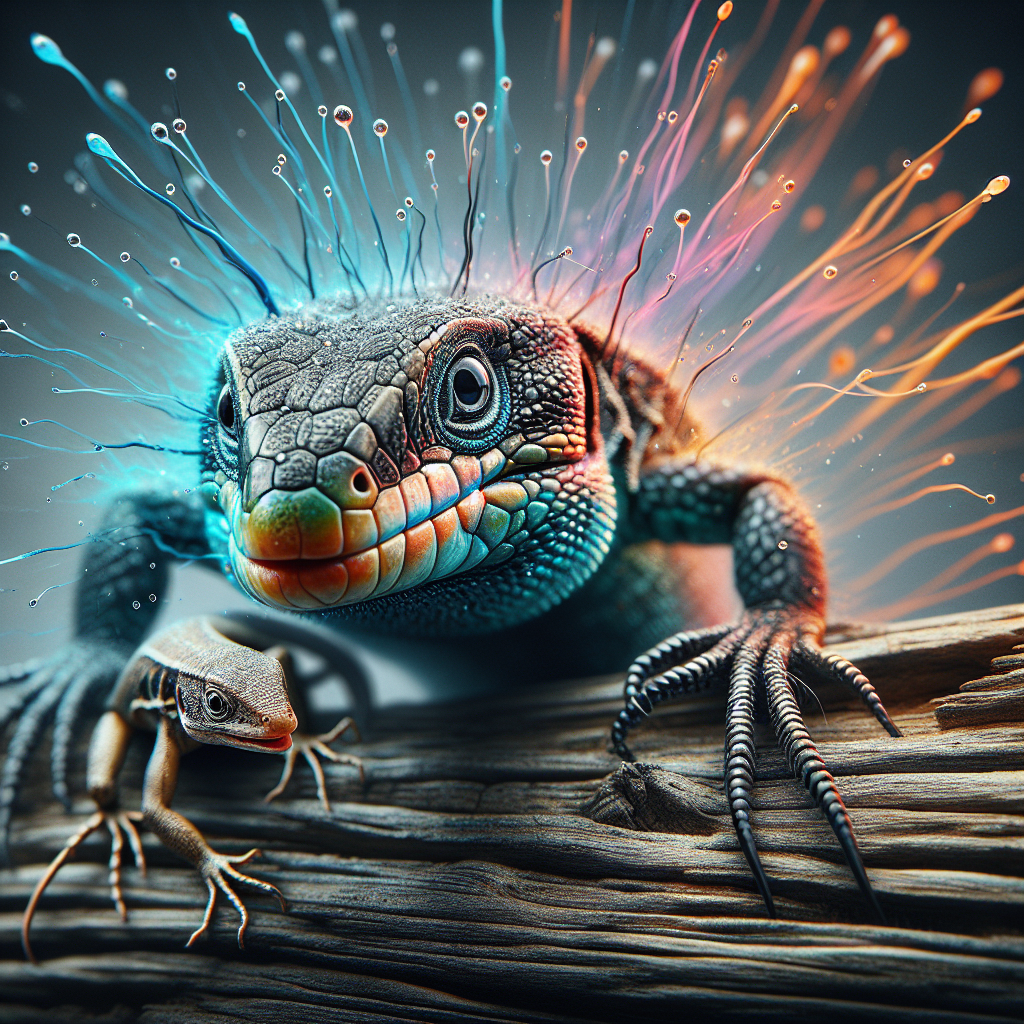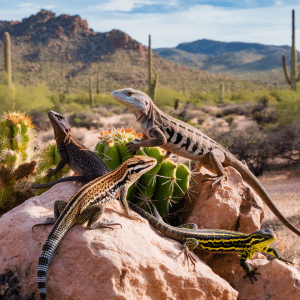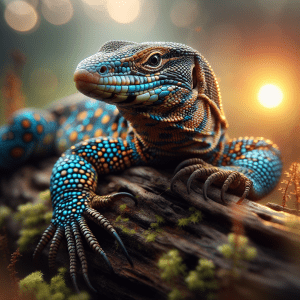Introduction: Exploring the Emotional World of Lizards
Have you ever stopped to wonder if lizards, those scaly creatures we often overlook, could actually experience anxiety? It’s a fascinating question that delves into the depths of animal behavior and emotions. As an expert in the field, I’ve spent countless hours studying these reptiles and uncovering the secrets of their inner world.
One interesting fact about lizards is how their behaviors can provide insights into their emotional state. For instance, did you know that certain species of lizards exhibit stress behaviors, such as tail flicking or hiding, when they feel anxious or threatened? Understanding these subtle cues can help us better care for our lizard companions and ensure their well-being.
When it comes to helping lizards manage anxiety, creating a safe and enriching environment is key. Providing ample hiding spots, proper lighting, and a balanced diet can go a long way in reducing stress and promoting a sense of security for your pet lizard. By mimicking their natural habitat as closely as possible, we can help them feel more at ease in our care.
So, the next time you observe your lizard displaying unusual behaviors, take a moment to consider if anxiety could be at play. By being attuned to their needs and emotions, you can forge a deeper bond with your scaly friend and provide them with the comfort and support they deserve.
Understanding Anxiety in Reptiles
Lizards, fascinating creatures that constantly surprise us with their behaviors and emotions. When it comes to anxiety in reptiles, it’s a topic that often raises eyebrows. Can these scaled beings really experience such a human-like emotion? Well, the answer might astonish you.
Research has shown that lizards, despite their tough exterior, can indeed experience anxiety. Just like us, they can exhibit signs of stress and unease in certain situations. Imagine a lizard basking under a heat lamp, suddenly disturbed by a loud noise – that moment of fear and apprehension is a glimpse into their emotional world.
Understanding anxiety in lizards is crucial for their well-being. From changes in behavior to physical symptoms like decreased appetite or restlessness, these signs can indicate that your scaly friend might be feeling the pressure. So, how can we help our lizard companions navigate these feelings?
Creating a calm and secure environment is key. Providing ample hiding spots, a consistent feeding schedule, and minimizing disruptions can go a long way in reducing their stress levels. Remember, even the smallest adjustments can make a big difference in their emotional state.
So, next time you observe your lizard behaving in an unusual manner, consider the possibility that they might be experiencing anxiety. By being attuned to their emotions and needs, you can ensure a happier and healthier life for your reptilian friend.
Signs and Symptoms of Anxiety in Lizards
III. Signs and Symptoms of Anxiety in Lizards
Have you ever noticed your lizard acting a bit off, maybe more skittish than usual? Maybe they’re hiding away more often, or their appetite seems to have taken a hit. These could be signs that your scaly friend is experiencing anxiety.
Lizards, like humans, can exhibit physical symptoms of anxiety. Watch out for excessive shedding, color changes, or unusual behaviors like pacing or tail-thrashing. These signs may indicate that your lizard is feeling stressed or anxious.
It’s important to pay attention to these subtle cues and provide a calm and secure environment for your pet. Remember, lizards are sensitive creatures and can pick up on changes in their surroundings.
If you suspect your lizard is experiencing anxiety, try to identify the root cause. Have there been any recent changes in their habitat or routine? Are they getting enough warmth and light? By addressing these factors, you can help alleviate your lizard’s anxiety and promote their overall well-being.
Remember, every lizard is unique, and what works for one may not work for another. Take the time to observe and understand your pet’s behavior to provide them with the best care possible. Your attentive approach can make a world of difference in ensuring a happy and healthy life for your scaly companion.
Factors Influencing Lizard Anxiety
With lizards, anxiety can be a complex issue. Imagine being a tiny reptile navigating a big world full of potential dangers. It’s no wonder they might feel a bit stressed out at times. But did you know that factors like environmental changes or lack of enrichment can also play a role in triggering anxiety in lizards? It’s not just about the size of their terrarium; it’s about creating a safe and stimulating space for them to thrive.
My experience with anxious lizards has taught me the importance of observing their behavior closely. A sudden shift in their usual habits could be a sign that something’s amiss. Maybe they’re pacing more than usual or showing signs of aggression. These subtle cues can offer valuable insights into their emotional well-being.
To help your lizard feel more at ease, consider introducing hiding spots or climbing structures in their habitat. These additions can provide a sense of security and enrichment, helping to alleviate their anxiety. Remember, a happy lizard is a healthy lizard!
Now, picture this: What if we could step into the shoes of our lizard friends for a day? How would we perceive the world around us differently? Understanding their perspective may just hold the key to unlocking a deeper connection with these fascinating creatures. Let’s embark on this journey together and delve into the intriguing world of lizard anxiety.
Research Findings on Lizard Behavior
Have you ever wondered what goes on in the mind of a lizard? It’s a fascinating topic that often gets overlooked. Research into lizard behavior has uncovered some intriguing findings that shed light on their emotional world. One interesting fact is that lizards, like many other animals, can experience anxiety in certain situations. Understanding the signs and symptoms of anxiety in lizards is crucial for their well-being. Just like us, these creatures can exhibit behaviors that indicate they are feeling stressed or anxious. As an expert in this field, I’ve seen firsthand how factors such as environmental changes or inadequate care can contribute to lizard anxiety. Providing a stress-free environment for your pet lizard is essential to help them feel safe and secure. It’s like creating a cozy retreat where they can relax and unwind. Have you ever noticed your lizard behaving differently in certain situations? Paying attention to their behavior can offer valuable insights into their emotional state. By understanding and addressing lizard anxiety, we can enhance the overall quality of life for these remarkable creatures. So, let’s dive deeper into the emotional world of lizards and discover how we can support them in living their best lizard lives.
How to Help Lizards Manage Anxiety
An interesting fact about lizard behavior is that they are highly sensitive creatures who can easily experience anxiety. Just like us humans, lizards can feel stressed and overwhelmed in certain situations. Imagine being a tiny reptile in a big, unfamiliar environment – it’s bound to make you feel a bit jittery, right?
So, how can we help our scaly friends manage their anxiety levels and create a harmonious living space for them? One practical tip is to ensure that your lizard has a cozy retreat where they can feel safe and secure. Providing hiding spots or cozy shelters can give lizards a sense of security and help alleviate their anxiety.
Another important aspect to consider is the temperature and lighting in their habitat. Lizards are ectotherms, meaning they rely on external sources to regulate their body temperature. By maintaining the right temperature and lighting conditions, you can help reduce stress and promote a sense of well-being in your pet lizard.
By understanding the factors that contribute to lizard anxiety and taking proactive steps to address them, you can make a positive impact on your pet’s emotional health. Remember, a happy and stress-free lizard is a healthy lizard!
Creating a Stress-Free Environment for Your Pet Lizard
Creating a stress-free environment for your pet lizard isn’t just about aesthetics—it’s about their well-being. Picture this: a cozy lizard habitat with plenty of hiding spots, basking areas, and proper temperature and humidity levels. It’s like a luxury spa for your scaly friend!
Now, here’s a fascinating fact: did you know that the layout of your lizard’s enclosure can significantly impact their stress levels? By providing a variety of environmental enrichments, you can help reduce anxiety and promote natural behaviors.
Imagine walking into a room that feels like home sweet home, complete with all the creature comforts your lizard craves. It’s like giving them their own little piece of paradise right in your living room.
So, how can you create this lizard paradise? Start by adding natural elements like rocks, branches, and plants for climbing and hiding. Consider incorporating a shallow water dish for hydration and a cozy shelter for privacy.
Think of it as interior design for your reptilian friend—except this design isn’t just about style; it’s about their health and happiness. With a bit of creativity and care, you can transform your lizard’s habitat into a stress-free sanctuary they’ll love coming home to.
Expert Insights: Can Lizards Benefit from Emotional Support?
Picture this: you’re a lizard owner, and your scaly buddy seems a bit on edge lately. What’s the deal with lizard anxiety, right? Well, let me share a little secret with you – lizards may not be as cold-blooded emotionally as you think.
Imagine your lizard buddy feeling a bit anxious before a vet visit – sounds familiar, doesn’t it? Just like us, lizards can experience stress in certain situations. But don’t worry; there are ways to help them chill out.
Now, here’s a fascinating tidbit: did you know that providing a cozy hiding spot can work wonders for your lizard’s anxiety levels? It’s like giving them their own little zen den where they can retreat when the world feels overwhelming.
You might be wondering, “Can lizards really benefit from emotional support?” The answer might surprise you. While they may not cuddle up for a therapy session, your presence and care can make a world of difference in their well-being.
So, next time you notice your scaly friend looking a bit jittery, remember that a little understanding and TLC can go a long way in helping them navigate their lizard anxiety. After all, even the toughest reptiles need a little love and support sometimes, right?
Common Misconceptions About Lizard Behavior
I know it may sound surprising, but lizards can indeed experience anxiety just like us humans. Imagine being a lizard, with predators lurking around and a constantly changing environment. It’s enough to make anyone a little jittery, right?
One interesting fact about lizards is that they are incredibly sensitive to their surroundings. Any sudden changes in their habitat can trigger stress and anxiety in these reptiles. So, as a responsible lizard owner, it’s essential to create a calm and stable environment for your scaly friend.
Now, let’s address a common misconception: some people believe that reptiles, including lizards, don’t have the capacity to feel emotions like anxiety. But research has shown that lizards exhibit behaviors that suggest they can experience stress and anxiety.
So, how can you help your lizard manage anxiety? Providing plenty of hiding spots, a consistent feeding schedule, and minimizing loud noises in their environment can all contribute to reducing their stress levels. Remember, a happy lizard is a healthy lizard!
Have you ever noticed your pet lizard displaying unusual behaviors? It could be a sign of anxiety. Keeping a close eye on your lizard’s behavior and making adjustments to their environment can go a long way in ensuring their well-being. After all, our scaly companions deserve all the care and attention we can give them.
Conclusion: Enhancing the Well-being of Your Lizard Companion
Have you ever wondered if lizards experience anxiety? It’s a fascinating topic that delves into the emotional realm of these seemingly stoic creatures.
An interesting fact about lizards is that they display a wide range of behaviors that indicate they may indeed feel anxiety. From hiding behaviors to changes in appetite, there are subtle signs that suggest lizards can experience stress much like other animals.
Research findings have shed light on the complex behaviors of lizards, showing that they are not as emotionless as commonly believed. Understanding these behaviors can help us provide better care for our scaly companions.
Creating a stress-free environment for your pet lizard is essential in helping them manage any anxiety they may experience. Providing ample hiding spots, proper temperature and humidity levels, and a balanced diet can go a long way in promoting their well-being.
As an expert in the field, I’ve seen firsthand the positive impact of addressing lizard anxiety. By observing their behavior and making necessary adjustments to their environment, we can help our lizards lead happier and healthier lives.
So, the next time you observe your lizard behaving in a peculiar manner, consider the possibility that they may be experiencing anxiety. By being attuned to their needs and providing a supportive environment, you can make a world of difference in their emotional well-being.




